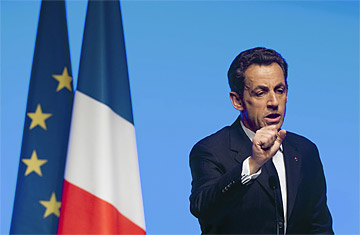
France's President Nicolas Sarkozy announces in Paris that France would rejoin NATO's integrated military command, March 11, 2009.
Wednesday's announcement by French President Nicolas Sarkozy he'll return France to full membership in NATO was hardly a surprise, but the defensive tone in which he made the announcement underscores the stiff opposition he's expected to encounter. Although France remained part of the Atlantic Alliance throughout the Cold War, President Charles de Gaulle in 1966 withdrew his country from the alliance's command structure, in order to preserve France's strategic independence — and that position has remained an article of faith in the French establishment until now.
Although France participates in a number of NATO missions from the Balkans to Afghanistan, "We have no posts of military responsibility [so] we have no say when the allies define the objectives and military means of operations we participate in," Sarkozy said in an address to the Foundation for Strategic Research at the Ecole Militaire in Paris. "France will be stronger and more influential, because it's the absent parties that are always at a disadvantage. France should co-direct rather than submit." (See pictures from the Kosovo town of Mitrovica, where French troops keep the peace)
Sarkozy argued that the strategic independence that de Gaulle had acted to protect was, today, a fact of life that was quite compatible with restoring full membership in the Alliance. Without it, he says, France takes on the responsibilities of a full member of NATO in Bosnia, Kosovo and Afghanistan without gaining the advantages of leadership. Besides, he said, it was wrong to base France's contemporary decisions on those taken by de Gaulle in his own day. "Would General de Gaulle, who rejected non-proliferation treaties all his life, hold the same views today?" Sarkozy challenged. "For many years, France has been preparing for wars it already waged."
Still, the President is expecting push-back from his left and right flanks at home ahead of France's official reintegration to NATO during the Alliance's 60th anniversary next month. Although he denounced "sterile anti-Americanism" as the major source of opposition to full French membership in NATO, he also addressed concerns over France's strategic independence by pointing to French positions at odds with those of the U.S. — on Syria, Iran and Cuba, for example — as proof that the country's freedom of action has not been undermined by a closer partnership with America.
Sarkozy had a blistering riposte to the claim by his rival and erstwhile presidential hopeful, former prime minister Dominique de Villepin, that full-fledged NATO membership would have forced France to participate in the Iraq war. "That is a shameful lie that dishonors those who repeat it," Sarkozy seethed. "The Iraq war had nothing to do with NATO membership — the proof being that [full member] Germany took its decision [to oppose the war] before France even had."
Still, Sarkozy faces a tough sell. Approving of the current arrangement as working just fine, Martine Aubry, leader of the opposition Socialist Party, urged that "there's no rush nor any fundamental reason" for France to seek full membership of NATO, accusing Sarkozy of basing the decision on "an ideology of Atlanticism". Former conservative prime minister Alain Juppé admitted that he "questions the utility" of full reintegration, whose "only interest is symbolic". The widespread skepticism makes Sarkozy's decision to put the matter to a parliamentary vote scheduled for March 17 into a de facto confidence vote in his leadership. Although the leftist minority in the national assembly is far too small to defeat the ruling right, a large number of NATO-skeptic conservative legislators are expected duck the vote.
"For some parliamentarians, this isn't imaginable," said Jean-Pierre Grand, a parliamentarian from Sarkozy's Union for a Popular Majority party, of the vote to return to NATO. "We're being told that, at the end of the day, this won't change much. If so, why is the government staking its responsibility to it?"
The good news for Sarkozy, though is that despite the audible grousing the return to NATO has unleashed, party loyalty is expected to ensure that the measure passes. Even better news for the President is that new polls show 58% of French public opinion supports the full reintegration to NATO, with only 37% hostile to the move. And that swing in public opinion behind full NATO membership is one that few people expected.
